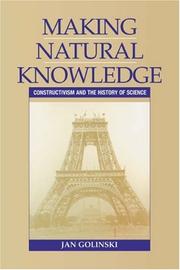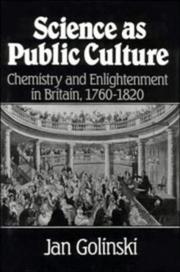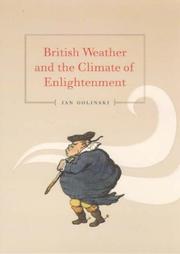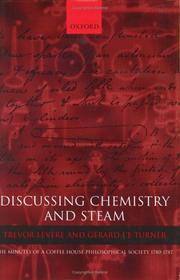| Listing 1 - 9 of 9 |
Sort by
|

ISBN: 0521444713 0521449138 9780521449137 9780521444712 Year: 1998 Publisher: Cambridge : Cambridge university press,
Abstract | Keywords | Export | Availability | Bookmark
 Loading...
Loading...Choose an application
- Reference Manager
- EndNote
- RefWorks (Direct export to RefWorks)
Methodology of economics --- Science --- Constructivism (Philosophy) --- History --- Historiography --- Historiography. --- History. --- Constructivism (Philosophy). --- Philosophy --- Science - History --- Science - Historiography

ISBN: 0521394147 0521659523 9780521659529 9780521394147 Year: 1992 Publisher: Cambridge: Cambridge university press,
Abstract | Keywords | Export | Availability | Bookmark
 Loading...
Loading...Choose an application
- Reference Manager
- EndNote
- RefWorks (Direct export to RefWorks)
Chemistry --- History --- History of chemistry --- Geschichte 1760-1820. --- 1700-1899. --- History of the United Kingdom and Ireland --- anno 1700-1799 --- anno 1800-1899 --- Chemie. --- Chemistry. --- Social aspects --- Social aspects. --- Great Britain. --- Great Britain --- 18th century --- 19th century --- Chemistry - Great Britain - History - 18th century. --- Chemistry - Great Britain - History - 19th century. --- Physical sciences --- Chimie --- Histoire --- 18e siecle

ISBN: 9780226302058 0226302059 9780226302065 0226302067 Year: 2007 Publisher: Chicago (Ill.) : University of Chicago press,
Abstract | Keywords | Export | Availability | Bookmark
 Loading...
Loading...Choose an application
- Reference Manager
- EndNote
- RefWorks (Direct export to RefWorks)
Enlightenment inquiries into the weather sought to impose order on a force that had the power to alter human life and social conditions. 'British Weather and the Climate of Enlightenment 'reveals how a new sense of the national climate emerged in the eighteenth century from the systematic recording of the weather, and how it was deployed in discussions of the health and welfare of the population. Enlightened intellectuals hailed climate's role in the development of civilization but acknowledged that human existence depended on natural forces that would never submit to rational control. Reading the Enlightenment through the ideas, beliefs, and practices concerning the weather, Jan Golinski aims to reshape our understanding of the movement and its legacy for modern environmental thinking. With its combination of cultural history and the history of science, 'British Weather and the Climate of Enlightenment 'counters the claim that Enlightenment progress set humans against nature, instead revealing that intellectuals of the age drew characteristically modern conclusions about the inextricability of nature and culture.
Meteorology - Great Britain - History --- Climatology --- Great Britain - Climate --- Climatology. --- Meteorology --- Weather. --- History. --- Great Britain --- Climate.
Book
ISBN: 9780226302317 Year: 2005 Publisher: Chicago (Ill.) University of Chicago Press
Abstract | Keywords | Export | Availability | Bookmark
 Loading...
Loading...Choose an application
- Reference Manager
- EndNote
- RefWorks (Direct export to RefWorks)
Book
ISBN: 022636884X 9780226368849 9780226351360 022635136X Year: 2016 Publisher: Chicago : University of Chicago Press,
Abstract | Keywords | Export | Availability | Bookmark
 Loading...
Loading...Choose an application
- Reference Manager
- EndNote
- RefWorks (Direct export to RefWorks)
What did it mean to be a scientist before the profession itself existed? Jan Golinski finds an answer in the remarkable career of Humphry Davy, the foremost chemist of his day and one of the most distinguished British men of science of the nineteenth century. Originally a country boy from a modest background, Davy was propelled by his scientific accomplishments to a knighthood and the presidency of the Royal Society. An enigmatic figure to his contemporaries, Davy has continued to elude the efforts of biographers to classify him: poet, friend to Coleridge and Wordsworth, author of travel narratives and a book on fishing, chemist and inventor of the miners' safety lamp. What are we to make of such a man? In The Experimental Self, Golinski argues that Davy's life is best understood as a prolonged process of self-experimentation. He follows Davy from his youthful enthusiasm for physiological experiment through his self-fashioning as a man of science in a period when the path to a scientific career was not as well-trodden as it is today. What emerges is a portrait of Davy as a creative fashioner of his own identity through a lifelong series of experiments in selfhood.
Chemists --- Scientists --- Davy, Humphry, --- humphry davy, baronet, cornish, chemist, chemistry, science, invention, inventor, scientist, lamp, electricity, electrochemistry, physical, electrical potential, chemical change, history, humanities, historical, 19th century, royal society, self experimentation, identity, selfhood, england, english, biography, education, scientific interests, herculaneum papyri, president, understanding, presentation.
Book
Abstract | Keywords | Export | Availability | Bookmark
 Loading...
Loading...Choose an application
- Reference Manager
- EndNote
- RefWorks (Direct export to RefWorks)

ISBN: 0198515308 Year: 2002 Publisher: Oxford : Oxford University Press,
Abstract | Keywords | Export | Availability | Bookmark
 Loading...
Loading...Choose an application
- Reference Manager
- EndNote
- RefWorks (Direct export to RefWorks)
Book

ISBN: 9780691218120 Year: 2021 Publisher: Princeton, NJ
Abstract | Keywords | Export | Availability | Bookmark
 Loading...
Loading...Choose an application
- Reference Manager
- EndNote
- RefWorks (Direct export to RefWorks)
Multi

ISBN: 9780691218120 Year: 2021 Publisher: Princeton, N.J. Princeton University Press
Abstract | Keywords | Export | Availability | Bookmark
 Loading...
Loading...Choose an application
- Reference Manager
- EndNote
- RefWorks (Direct export to RefWorks)
| Listing 1 - 9 of 9 |
Sort by
|

 Search
Search Feedback
Feedback About UniCat
About UniCat  Help
Help News
News